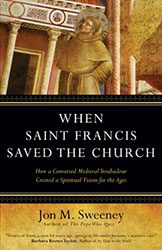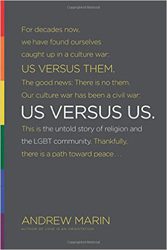 Jon Sweeney’s When Saint Francis Saved the Church presents a vision of Francis’ message that is as relevant today as it was in Francis’ time. Today’s church needs saving, and so do we. We need to move from pathways of death to thoroughfares of abundant life. We need to choose Jesus over Caesar, and love over coercion, first in the church and then in the world. We need a faith that is fluid and lively, and awake to the world in which we live.
Jon Sweeney’s When Saint Francis Saved the Church presents a vision of Francis’ message that is as relevant today as it was in Francis’ time. Today’s church needs saving, and so do we. We need to move from pathways of death to thoroughfares of abundant life. We need to choose Jesus over Caesar, and love over coercion, first in the church and then in the world. We need a faith that is fluid and lively, and awake to the world in which we live.
We are on the verge of a new adventure in Christianity. The spiritual landscape has radically changed in both the Northern and Southern hemispheres, and the novelty of our time calls for changes in our vision of Christ’s mission for today.
The first participants in the Way of Jesus truly made it up as they went along. They had no established doctrines, institutions, or scriptures of their own. They were often at odds with each other (for example, Paul and Peter, as reported by Paul in Galatians, on the question of kosher and non-kosher practices) in trying to articulate appropriately flexible boundaries of the new faith. The only scriptures they had were what we today call the Old or First Testament and the meaning of these words was in flux in light of the ministry, mission, cross, and resurrection of Jesus.
Today, we are also making it up as we go along. The old pathways are in question and new routes are still emerging. Some will be fruitful, some dead ends, others bounding on the heretical but in their heresy contributing new energy to the church. Perhaps, this is the way it has always been. In his own time, St. Francis may also have seen himself as making it up along the way, trying to forge a new vision of Christianity in a time of institutional stagnation and religiosity that betrayed the simple teachings of the Galilean savior.
Francis got back to the basics – simplicity of life, appreciation and care for embodiment and the non-human world, and faithfulness to the non-hierarchical and welcoming vision of Jesus. These values are still relevant to our time, and perhaps even more so than in Francis’ time.
Francis lived as well as taught simplicity, and we need to follow his path today. We need to embrace a spiritual downward mobility to match our necessary environmental simplicity. Global climate change, in whatever form we understand it, challenges us to rethink our economics, politics, and spirituality. We must live more simply so others can simply live, and many of these “others” are our future unborn generations. If we love our grandchildren and their unborn children, our calling is to preserve their world and this means taking, in our case, a twenty-first century pathway of St. Francis. We don’t need to wear a loin cloth, or scorn material possessions to live more simply. Still, we need to live with modesty, walking gently on the earth and focusing more on processes (experiences) than possessions.
Francis appreciated embodiment and the non-human world. Though steeped in the doctrines of the church, especially original sin and denigration of the temporal in light of eternity, Francis was surprisingly this-worldly and incarnational in his approach to life. We are called to love God in the flesh and this means caring for our bodies and the bodies of others. It also means seeing the presence of God revealing itself to us in the non-human world. Non-human creatures have value apart from our interests and make an ethical claim on us. They are not at our disposal; we must adapt to their needs and honor their feelings, especially the reality of suffering among non-humans. This inspires an earth-ethic, honoring brother sun, sister moon, the birds of the air, the animals of the field, and the sea creatures.
Francis aimed at an egalitarian, non-hierarchical world, and a non-hierarchal and egalitarian church. Following Jesus’ welcome table, Francis affirmed that everyone belonged at God’s table; the church was to be inclusive in practice. There is no “other,” no one totally alien from us. Francis sought to reach out to Muslims despite the vitriol of the Crusades. He reminds us that the goal of our policies today, especially with the Arab and Muslim world, should aim at friendship and not annihilation. We may not be able to hug members of ISIS, and we must find ways to neutralize their power, but we need not demonize them. Can we see God’s presence – Allah’s presence – in an ISIS militant? This isn’t easy, especially when they mercilessly kill others, whose deaths call for military action on our part.
Francis may have “saved” Western Christianity many centuries ago. The pathway he took is saving the church in its many manifestations today through its challenge to embody radical grace and affirmation of all God’s human and non-human creation.












